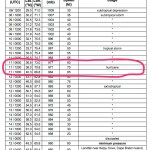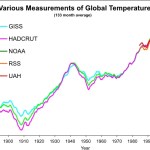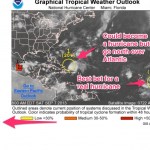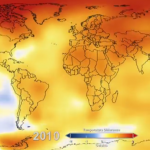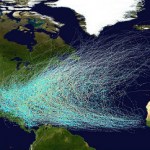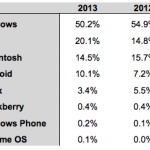
The disturbance off the west coast of Africa that I mentioned earlier is now officially Tropical Depression Number Nine.
It is forecast that Nine will turn into a hurricane in about 72 hours, though one model suggest much sooner.
The last time that no hurricane formed in the Atlantic before September 11th was ... well, never (for the period of good records). So if the Nine becomes Humberto (that's the next name on the list) a little late, on the 12th, Humberto becomes a record storm, of sorts ... the first hurricane after the longest delay in the Atlantic. If, however, Nine becomes…
We are two days away from the peak day for hurricane season (with many more days of hurricane season coming, of course). Yet there have been no Atlantic Hurricanes. In just a few days (on September 11th) if we don't have a hurricane, we'll break the record for latest over the period of record keeping.
There is a storm forming off the coast of Africa that might become a hurricane before September 11th. Or maybe not. The race is on!
Anyway, Paul Douglas of Weather Nation has a video explaining the current situation:
Melissa Harris-Perry hits on so many important points here that I'll probably use this in class:
Visit NBCNews.com for breaking news, world news, and news about the economy
Joe Kernen is a business finance talking head who co-hosts CNBC's Squawk Box. I don't know if he actually knows much about Wall Street, but I can prove he doesn't know squawk about Climate Science. Have a look (warning: Might make you dizzy):
Something about a low participation rate because people are getting older. But that's kind of unclear. Obviously, what is needed is a nice clear analogy from .... climate science!
So, the warmest period ever was in the 1930s when there were much lower CO2 levels. I did not know that.
Then the glaciers retreat and there are big forests. Arm…
Over the last several days the Atlantic has been very active, producing numerous storm systems that had promise to turn into something. Only one did, Gabrielle, and Gabrielle downgraded to a stormy blob (#1 on the above graphic from the National Weather Service). Gabrielle may well be back as a tropical storm, but there is only a small chance of that. If exGabrielle does turn into something it will most likely go straight north in the Atlantic. The second item is something that the NWS hurricane people have been watching since it was over the Sahara, hinting in their regular updates that…
Years ago I knew Richard Dawkins as a fellow evolutionary biologist (met him only once, at a memorial event for WD Hamilton, but we have numerous mutual friends and colleagues). To be frank, and I'm only being frank now because I'd prefer not to use my real name, Dawkins was considered a bit of an enigma. He had great fame (and fortune and privilege) but that was without doing much important research. I always defended him back in those days. His fame came from The Selfish Gene and his subsequent books, and his popularization of science was well done and important. Those who complained,and…
From Climate Bites we have this nice meme thingie:
Over the last decade the surface temperatures of the earth have increased. During the previous decades, the surface temperatures of the earth increased at a somewhat higher rate. Meanwhile, over the last decade there seems to be some extra heat gain in the deeper ocean. Also, some of the surface heat is busy melting the planet's glaciers and the Arctic Sea ice. That heat does not contribute to the surface heat measurement. So, global warming has not slowed down.
This is what we know.
Here is a nice video that explains some of this from the Yale Climate Forum, made by Peter Sinclair.
I love it when controversy develops in climate science. It demonstrates that climate science is a science, not dogma. Also, it is interesting. And, ultimately, it is important because we need to reduce uncertainty and addressing controversy eventually does so.
There is a new controversy in climate science about a vitally important issue. Last year, Hurricane Sandy (aka Superstorm Sandy aka Frankenstorm Sandy) devastated coastal New Jersey and flooded the Battery in Manhattan. This was a highly unlikely event. Estimates of how likely it is for a major hurricane to follow the path Sandy…
In this Labor Day message, Robert Reich, the former Secretary of Labor and subject of the upcoming documentary “Inequality for All,” breaks down what it’ll take for workers to get a fair share in this economy — including big, profitable corporations like McDonald’s and Walmart to pony up and finally pay fair wages.
Here's the petition.
Here is a press release for an upcoming event:
At the culminating event on the 66 mile Energy Exodus march, over 150 ralliers will call for the Town of Barnstable to withdraw its lawsuit against the Cape Wind offshore wind farm and begin negotiating in good faith with Cape Wind and federal and state agencies. They will demand that the Town stop taking money from local oil billionaire Bill Koch, who has put over $1.5 million into efforts to delay the wind farm.
Rally speakers will also highlight upcoming opportunities in New England for the marchers to continue advancing the global and…
You can read the details here. The situation is appalling.
On this blog.
Below is the relative percentage of operating system use by the readers of this blog from a four month longs sample form the middle of the year last year compared to the most recent six months this year. There is not a lot of change, but notice the nearly five percent drop i nWindows use, which seems to be taken up mainly by an increase in the use of iOS.
In addition, Linux use has dropped a worrying two percent.
However, really, OSX and Android etc. are all based on Unix-like operating systems, so the numbers for this year can be recalculated to look like this:
But…
I suspect Scienceblogs.com is under attack. Why? Because the site is going really really slow, and the spam coming in is different ... huge spamy comments with a zillion links which I think send the server into conniptions. I've closed comments on all posts over five days in age on this blog, for the time being. Sorry for the inconvenience.
Andrew Revkin thinks so:
It is hard to interpret this as meaning anything other than the crisis of Arctic Sea ice melting too much and too fast is over. This is an important thing, because the rapid and widespread melting of sea ice in the Arctic seems to be causing a thing called Arctic Amplification, which means in normal human terms that the Arctic is warmer (amplified) than normal. This causes a decrease in the differential between equatorial heat and polar heat in the Northern Hemisphere which seems to change the way the Jet Streams operate which in turn causes Weather Whiplash, where…
From Time Team America:
Fort James, South Dakota
In 1865, a unit of cavalry soldiers thought they had volunteered to fight in the Civil War. Instead, they found themselves sent west to keep the peace between incoming pioneer settlers and the Sioux Indians in what is now South Dakota. Upon their arrival, the soldiers built Fort James, one of the few stone forts on the American frontier. The fort's quartzite walls still peek out from under a grassy field that seems to have somehow survived intact. The site has never been excavated but experts believe that the fort's remains hold a time capsule…
The National Park Service (NPS) and the Museum of Northern Arizona (MNA) excavated nine archaeological sites along the Colorado River in the Grand Canyon during three years of fieldwork. The NPS/MNA excavation project was the first major archaeological excavation to occur along the river corridor in Grand Canyon in nearly 40 years. The NPS has a "preservation-in-place" mandate, and excavates archaeological sites only when they cannot be stabilized and preserved in place. These sites were disappearing due to erosion; artifacts were literally washing into the river. Because these sites were…
Europe's Oldest Town?
Bulgarian archaeologists led by Professor Doctor Vasil Nikolov, from the National Archaeology Institute and Museum, claim to have discovered one of the oldest towns in Europe, in north-east Bulgaria.
Dr. Nikolov, who has been studying the area for many years, located the town near the salt pans in the vicinity of Provadia in the Varna Region, the same locale as the first salt factory in Europe.
[Dr. Vasil Nikolov, National Archaeology Institute and Museum]:
"We can now say that the Provadia salt pans are in the oldest town in Europe, existing between 4,700 to 4,200 BC,…
Using Optically Stimulated Luminescence (OSL) sample collection demonstrated and explained by Darrin Lowery:
This is a bit of the excellent documentary "The Human Spark" featuring my friend John Shea teaching Alan Alda how to be a good hominid. No actual animals were speared during this video.
